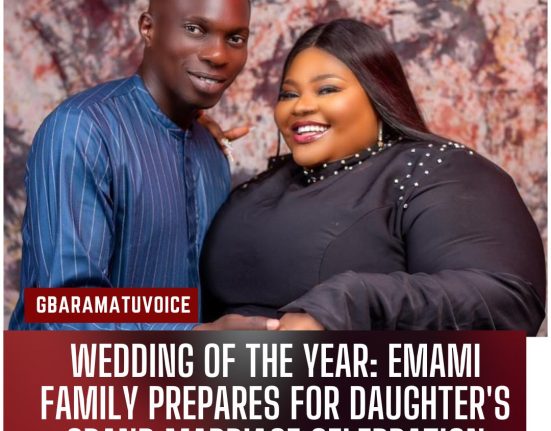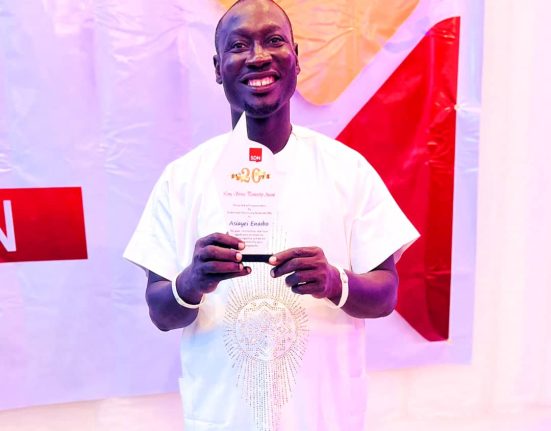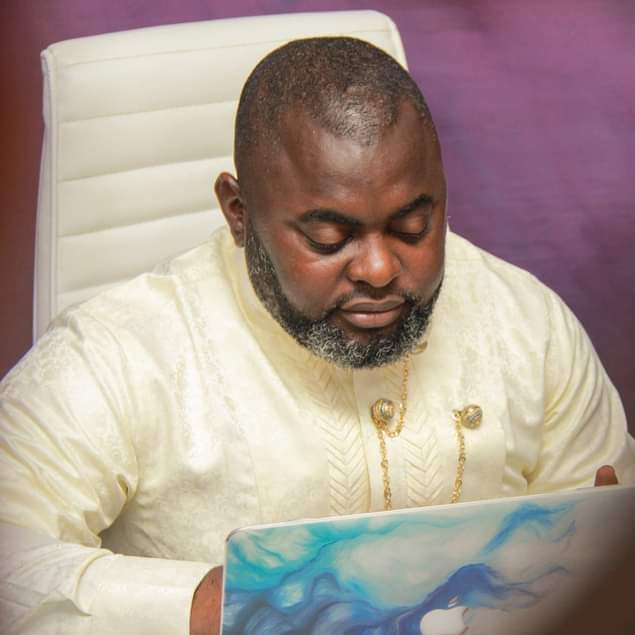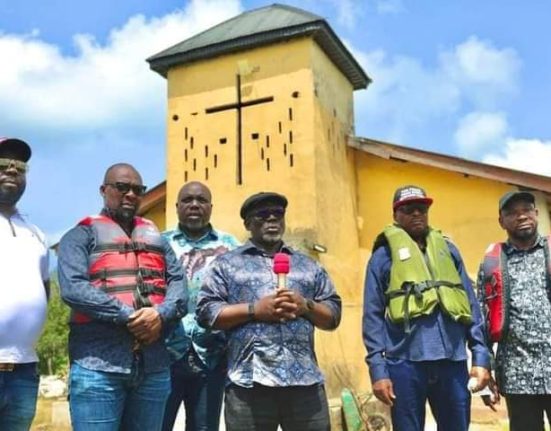The commonness of child brides in Nigeria is becoming astronomical with poverty fingered as a factor leading families to give out their girl children to older men for marriage. ODIMEGWU ONWUMERE writes that 23 million girls are already victims of child marriage in Nigeria and while one in every five girls is married before her 18th birthday, some are kidnapped into marriage, sensitisation campaign to disorientate the practice has however become top priority of some persons and organisations.
Chinwe, 15, was married to a supposedly 56 year old Mr Izuchukwu Igwilo early this year for the lucre of wealth. Not only was Igwilo old enough not to marry Chinwe, he was also a candidate of special needs.
Their marriage took place at Ozubulu, Anambra State, South-east of Nigeria. The stupendous wealth the Igwilos paraded spurred Chinwe’s family to give her out to Izuchukwu Igwilo.
Chinwe was already a nursing mother of a 6 month baby, an out of wedlock produce. Poverty and her ordeal compounded her situation. Hence, her compellation to marry the older man in order to enjoy the man’s share of the family wealth, since he was mentally sub-normal.
Conjectures were also that, should she give birth for Izuchukwu, his family members would take responsibilities of raising the child, due to their brother’s defectiveness.
Since her parents and she were not well to do financially, she lost her voice in the midst of the conundrum. She rather resorted to enjoy the wealth, even though she could be frowning at the not-too-normal man, who became her husband through persuasive means. She could not even question her fate. She relaxed. The parents’ thought and hers, were conversely not the thought of some persons and individuals in the country.
Voices raised
When Chinwe’s marriage was made public late January this year, the social media was characterised by #RetrieveChinwe. The activism was first noticed on Facebook when a Nigerian entrepreneur, Vivian Queenstine Diora made a post in respect to the marriage on a popular social group known as and called Rant. The post did not just contain the man’s age and health status, it also pointed out that the man was an alcoholic.
Since Chinwe had lost her voice to speak up, some persons and groups moved in to rescue her thereby defining the country’s Child’s Rights Act detailing that 18 years of age was the minimum age for marriage, even when the Nigerian legal system had different interpretations to the Act.
Our reporter who monitored the outcome of the marriage gathered that Prince Gwamnishu Emefiele Harrison who was based in Awka, Anambra State, where he was perfecting his Human Rights activistivism, moved in to give Chinwe a voice.
“Inter alia, I had an approved petition by the Anambra State Police Command to rescue Chinwe,” said Harrison. “My plan was to pick Chinwe up and hand her to the Ministry of Women Affairs, Anambra State.”
Harrison did not only talk; he kept his promise. Chinwe was rescued from her rather confinement erroneously called marriage on February 2, 2019, with some supports from the Nigeria Police Force, Ministry of Women Affairs, Legal luminaries and unconfirmed voices too numerous to note. Nevertheless, this was not without some members of her family apparently pointing to the contrary.
“When I saw Chinwe’s parents and discussed the issue with them, the mother said that Chinwe was of marriageable age because she (Chinwe’s mother) got married at 13,” Harrison added. “But I proved her wrong and also enlightened her of the price of their actions in the face of law.”
Millions not rescued
Investigations revealed that Chinwe was not the only girl forcefully married to men, but no fewer than 700 million women alive today, were married as children across the globe.
Those who knew better sermonised that Africa boasted of about 17 per cent of them, which meant that 125 million of them, were in Africa.
Incidences of child marriage abounded such that the victims have had sorry tales. Just in 2015, Wasila Tasi’u, 14, forced against being forcefully married to an older man in Kano State, by poisoning her 35-year-old husband and three others. In Niger State, the media were awash when a 70 year old Mr Yakubu Chanji married a girl alleged to be 15.
While this lasted, some editors of national newspapers in the country lamented the health challenges professionals said were associated with girl child marriage, which included Vesico Vaginal Fistula (VVF). They said that no fewer than 20,000 new cases of VVF were reported annually given child marriage.
“VVF is anomalous fistulous territory that permits the nonstop spontaneous release of urine. Generally, child marriage has been traced to be the cause in some victims of VVF,” as according to the source.
Apprehension on increase
The United Nation Entity for Gender Equality and the Empowerment of Women (UN Women), was horror-struck that the number of child brides would triple in Nigeria and across Africa by 2050, if salient measures were not put in place to curtail the menace.
The apprehension of the international organisation was that the continent of Africa would overrun South Asia with the hydra-headed number of child brides around the world.
The organisation did not only mention the nuisance of child brides in Nigeria, but also pointed out that the country and component countries in Africa, were still enmeshed with female genital mutilation, and this remained a chief priority of the United Nations.
Upon outlawing child bride
Nigeria outlawed child marriage in 2003. On the contrary, the 2018/2017 Multiple Indicator Cluster Survey, MICS, revealed that over 18.5 per cent of girls in the country were still married before age 15.
This was the same way international agreements that comprised the Convention on the Rights of the Child and the Convention on the Elimination of all Forms of Discrimination against Women, prohibited child marriage.
The United Nation Entity for Gender Equality and the Empowerment of Women (UN Women), said that 23 million girls were victims of child marriage in Nigeria.
Ms Comfort Lamptey who’s the country representative of the world group stated this on December 2 2018, at a media briefing while observing the 16 days of enlightenment against gender based violence campaign 2018 in Abuja.
Lamptey frowned that one out of five women and girls in Nigeria aged 15-24 were conspicuously victims of molestation and human trafficking. She added that the aftermath of Boko Haram (a dreaded Islamic terrorists group in the country) had resulted to estimated 1.8 million women being called Internally Displaced Persons (IDPs) and camped in deprecating places in the affected states, especially in the North East of Nigeria.
She believed that girls and women who faced violence were not heard and they should be given room to be heard.
“With women and girls bearing the brunt of abduction, forced marriage and being used as human bombs; gender-based violence is evident also in the political realm, where women have reported numerous cases of victimisation, intimidation and harassment, in order to side-line them in the upcoming 2019 General Elections…,” she said.
“Their stories need to be brought to light. This is why the UNiTE Campaign’s global advocacy theme year is: Orange the World: #HearMeToo”.
Child brides in regions
In its 2017 report, UNICEF amplified that 43% of Nigerian girls were married off before their 18th birthday, while 17% were married before they turned 15.
Checks revealed that these percentages varied from one political zone in the country to the other, with the North West recording the highest percentage – 76%, while the South had but 10%, especially in the South Eastern zone.
Against this backdrop, the United Nations Entity for Gender Equality and the Empowerment of Women (UN Women) 2018 report also revealed that Nigeria ranked number 11, out of 20 countries with prevalence of child marriage, whereas 17 countries were in Africa.
Factors leading to child marriage
There were blights of child marriage in Nigeria which were connected to religious, cultural and traditional rites, including poverty.
In the UN charter, 18 years was officially taken to mean adulthood but this was not the thought of many States in Nigeria. Illiteracy was not exempted from the category of the blights of child marriage in the country.
The Senate held in 2013 that Section 29 (4) (b) of the 1999 Constitution (as amended) was sacrosanct not minding the examination of its committee on that matter, with a suggestive draft for the removal of Section 29 (4) (b) which demanded that “any woman who is married shall be deemed to be of full age.”
“Nevertheless this segment pacts with the certifying age for repudiation of citizenship, its relationship with child marriage surfaced from the earlier Section 29 (4) (a) which gives room that “full age means the age of eighteen years and above”, said the editors.
Speaking up against child marriage
Just like Harrison went to rescue Chinwe and gave her hope of a brighter future, many notable Nigerians that included Nobel laureate, Professor Wole Soyinka and human rights activist, Mr Femi Falana (SAN), lent their voices in condemnation of child marriage no matter the coloration given to the practice. The worse, they lamented, was kidnapping girl children anywhere, for the purpose of forcing them into marriage.
In the same manner, the wife of the President, Hajiya Aisha Buhari cried out against the pervasiveness of child marriage in northern Nigeria, where she made case that more than 50 percent of girls in the North were married before the age of 15. She made this known on October 20 2015 in Abuja, at the National Conference on Social Protection for the Girl Child, organised by ActionAid in partnership with Ford foundation, where she was represented by the wife of the Vice President, Mrs. Dolapo Osinbajo.
At a press conference on March 6 2016, in Lagos, Professor Soyinka sent those who were lacing religion reaction around child marriage to the cleaners. He believed that it was very wrong for anyone to damage a child because of degeneracy, as such, would leave the child with ruinous tendencies that would include trauma.
A scribe with the Ford Foundation, Innocent Chukwuma, at the National Conference on Social Protection for the Girl Child, organised by ActionAid in partnership with Ford foundation, posited that child marriage was against the girls’ human rights as it would likely introduce violent tendencies and obnoxious circumstances, social exclusion and poverty in the child.
Chukwuma added that it was not even good for their educational future and success. This was as he concluded that it would also expose them to larger health hazards such as maternal mortality, maternal disability, infant disability and HIV.
Falana interpreted the law with discontentment at the heightening occurrence of child marriage. He highlighted that it was unlawful to marry a girl without the parents giving their consent; that’s for those who were kidnapping girl children. But the Emir of Kano, Sanusi Lamido Sanusi in his presentation at the occasion where Mrs Buhari was represented, was worried that the right of the father to give out her daughter’s hand in marriage without her paying heed to the marriage should not be supported in whatever language used in approving of it. Soyinka therefore, called on the authorities to see child marriage as a crime against the constitution and legal structure that held the citizens.
Odimegwu Onwumere writes from Rivers State. E-mail: apoet_25@yahoo.com
Support Quality Journalism in the Niger Delta Region
Join us in our mission to bring development journalism, cultural preservation, and environmental awareness to the forefront. Your contribution makes a difference in the lives of the people of the Niger Delta. Donate today and be a part of the change!








